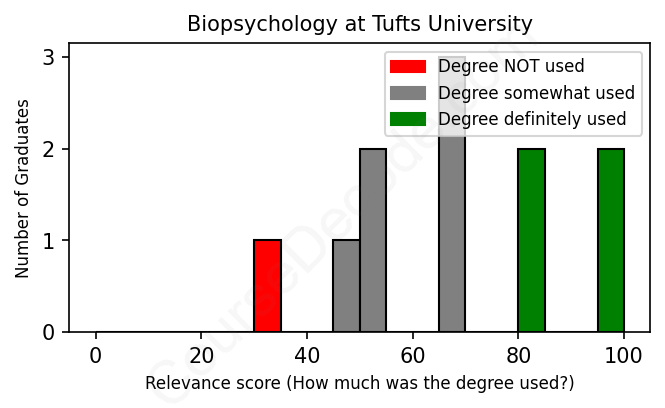
First, some facts. Of the Biopsychology graduates from Tufts University we've analyzed , here's how many have used (or NOT used) their degree in their career:

These are estimates based on AI analysis of 11 LinkedIn profiles (see below).
The verdict? On par with the average. Overall, with an average relevance score of 67%, Biopsychology graduates from Tufts University have about the same likelihood of finding work in this field as the average graduate across all fields:
And for comparison, here's the chart for all profiles we've looked at across all degrees.
Also, after graduating, 45% of these graduates have pursued further education other than another Bachelor's degree (such as a Masters degree or other), compared to the average across all profiles of 35%. This suggests you may need more than just a Bachelors degree to be competitive as a Biopsychology graduate.
See the details:
|
Relevance score: 68% We think this person has gone into a career only somewhat relevant to their degree. We think this person has gone into a career only somewhat relevant to their degree.
DEGREE INFOGraduated in 2015 from Tufts University with a Bachelor of Science (B.S.) in Biopsychology. No other secondary education since. JOB HISTORY SINCE GRADUATIONSoftware Engineering Manager AMT Ltd. May 2019 - May 2021 Technical Project Manager  Life.io / Zinnia Oct 2021 - Jun 2022 Product Manager  Xealth Jun 2022 - Jan 2024 ABOUTR&D principal and consultant with a love for automation, product development, and problem solving. Makes thoughtful decisions and recommendations to drive business impact with the combined experience and perspective as a user, developer, manager, product owner, and business owner. |
The top 10 most common jobs done by the graduates we've analyzed (ranked most common to least) are:
When looking at the career paths of Tufts University graduates with a degree in Biopsychology, it's interesting to note that many have ventured into fields that are somewhat related to their studies. A lot of these roles, such as Care Advisor, Data Integrity Coordinator, and even various positions in animal care, seem to touch on the periphery of biopsychology principles—like interpersonal communication and an understanding of behavior—without deeply engaging in the core psychological concepts. While jobs like those in healthcare informatics and public health consulting harness significant elements of biopsychology, many positions don’t actively apply the comprehensive scientific foundations typically associated with this degree.
Interestingly, while there are roles in education, research, and healthcare that align well with the principles of biopsychology, others, like teaching positions or management roles in hospitality, may utilize only a tip of the iceberg in relation to the training received. Ultimately, it appears there's a mixed bag of relevance; some graduates are indeed using their degree to make an impact in fields closely tied to biopsychology, while others have found themselves in roles where the connection is far less direct. So, if you're considering a degree in Biopsychology, it might be good to keep in mind that while many opportunities align with your studies, not all paths will immerse you fully in the discipline's core competencies.
Here is a visual representation of the most common words in job titles for Biopsychology graduates (this is across all Biopsychology graduates we've analyzed, not just those who went to Tufts University):

So, if we take a look at the career trajectories of biopsychology grads from Tufts University, it seems like there's a mix of paths that people have taken after graduation. Many of them land their first jobs in roles related to healthcare, research, or education, which aligns pretty well with their degree. For instance, there's a good number of graduates who found work as clinical informatics analysts, research assistants, and medical assistants right after school, diving straight into roles that have a strong connection to biopsychology. This initial focus shows that they're leveraging their education effectively in the job market.
Fast forward a few years, and it's interesting to see how some of these trajectories evolve. A number of graduates seem to stick to health-related fields, moving up the ladder into roles such as public health consultants and even resident surgeons, which reflects a commitment to the medical and research sectors. On the flip side, there are also grads who veer off into education or completely different career areas, like software management or teaching, indicating that not everyone stick to their major’s core subjects. Overall, while many Tufts biopsychology graduates appear to be finding success in relevant fields, there’s also a significant number who explore diverse career options. So, it's definitely a mixed bag!"
Honestly, a Bachelor’s degree in Biopsychology can be pretty challenging, especially at a school like Tufts University, which is known for its rigorous academic environment. You’ll be diving into complex topics that blend biology and psychology, so expect to tackle a lot of detailed material about the brain, behavior, and the science behind it all. That being said, if you're passionate about the subject and willing to put in the effort, it can be really rewarding. Just be prepared for some tough coursework, especially in areas like neuroscience and statistics. Overall, it's definitely on the harder side compared to some other degrees, but if you’re interested, the hard work can be worth it!
Most commonly, in the LinkedIn profiles we've looked at, it takes people 4 years to finish a Bachelor degree in Biopsychology.
Looking at these Tufts Biopsychology graduates and their job paths, it seems like they’ve had a pretty mixed bag when it comes to making decent money. Some have landed more stable and higher-paying positions, especially those who’ve gone into fields like clinical informatics or research, which usually pay well, especially as you climb the ladder. However, others have stuck to roles that are lower-paying or more entry-level, like teaching or various on-site jobs. The more STEM-related paths tend to have better earnings potential, while the roles leaning towards education and animal care seem a bit less lucrative overall. So, in a nutshell, there’s definitely a spectrum of salaries, and it really depends on where they decided to focus their careers after college!
Here is a visual representation of the most common words seen in the "about" section of LinkedIn profiles who have a Bachelor degree in Biopsychology (this is across all Biopsychology graduates we've analyzed, not just those who went to Tufts University). This may or may not be useful:

Here are all colleges offering a Bachelor degree in Biopsychology (ordered by the average relevance score of their Biopsychology graduates, best to worst) where we have analyzed at least 10 of their graduates:
| College | Score | Count |
|---|---|---|
 University of Michigan University of Michigan
|
73 | 10 |
 Tufts University Tufts University
|
67 | 11 |
 UC Santa Barbara UC Santa Barbara
|
64 | 10 |
 University of California, Santa Barbara University of California, Santa Barbara
|
61 | 15 |